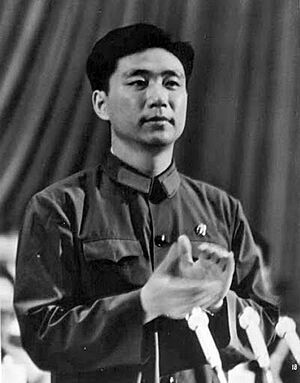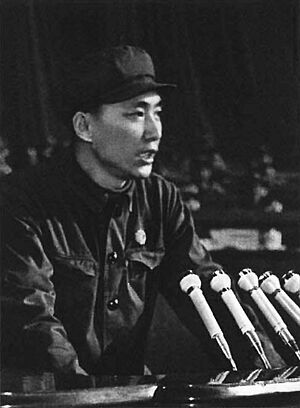Wang Hongwen facts for kids
Quick facts for kids
Wang Hongwen
|
|||||||||||
|---|---|---|---|---|---|---|---|---|---|---|---|
|
王洪文
|
|||||||||||
 |
|||||||||||
| Vice Chairman of the Chinese Communist Party | |||||||||||
| In office 30 August 1973 – 6 October 1976 |
|||||||||||
| Chairman | Mao Zedong Hua Guofeng |
||||||||||
| Personal details | |||||||||||
| Born | 6 December 1935 Xinjing, Manchukuo (now Changchun, Jilin, China) |
||||||||||
| Died | 3 August 1992 (aged 56) Beijing, China |
||||||||||
| Political party | Chinese Communist Party (1953–1976) | ||||||||||
| Spouse | Cui Gendi | ||||||||||
| Children | 3 (2 sons and 1 daughter) | ||||||||||
| Military service | |||||||||||
| Branch/service | |||||||||||
| Years of service | 1950-1956 | ||||||||||
| Rank | Second Lieutenant | ||||||||||
| Battles/wars | Korean War | ||||||||||
| Chinese name | |||||||||||
| Chinese | 王洪文 | ||||||||||
|
|||||||||||
Wang Hongwen (born December 6, 1935 – died August 3, 1992) was a Chinese worker and political leader. He was the youngest member of a group known as the "Gang of Four". Wang became very important during the Cultural Revolution (1966–1976). He helped organize the Shanghai People's Commune, which made him a key figure in China's leadership. At one point, he was the second highest-ranking leader in the Chinese Communist Party (CCP). After Mao Zedong died in 1976, Wang was removed from power. He was later arrested and sent to prison.
Contents
Early Life and Military Service
Wang Hongwen was born in a village near Changchun, in the Jilin province of China. In 1950, when he was about 15 years old, he joined the army. The next year, in 1951, he took part in the Korean War. He worked as a messenger and played the horn during his time in the war.
In 1953, he joined the Chinese Communist Party. After the war, Wang moved to Shanghai. He worked at the Shanghai No. 17 Cotton Textile Mill. He started as a machine operator. Later, he moved to the factory's security department. He eventually became in charge of security work for the factory's militia.
Rising in Chinese Politics
On June 12, 1966, Wang Hongwen challenged the factory leaders. He and others put up a Big-character poster, which is a large public notice. In this poster, they accused the leaders of having wrong ideas. At first, he was criticized for this. However, a special team sent to the factory to support the Cultural Revolution approved of his actions. This first team was later replaced by another team from Shanghai. This new team did not support Wang Hongwen's challenge.
In October, Wang put up another poster. This time, he criticized the new team. He also started a group called "Warriors Sworn to the Death to Carry Through with the Cultural Revolution to the End." He traveled to Beijing with 15 of his followers. When he returned, other rebel groups in Shanghai admired him. This helped him become the leader of the Shanghai Workers Revolutionary Rebel General Headquarters, which was formed in November.
Through this role, he met Zhang Chunqiao. He also became involved with a Red Guards group. In January 1967, he helped organize the Shanghai People's Commune. This made him a well-known rebel leader across the country.
Becoming a Top Leader
At the 9th National Congress of the Chinese Communist Party in 1969, Wang was chosen to be a member of the Central Committee. After an event involving another leader named Lin Biao, Wang was put in charge of an investigation in Shanghai. He reported directly to China's top leader, Mao Zedong.
At the 10th National Congress of the CCP in 1973, Wang was just 38 years old. He was promoted to the second-highest position: CCP Vice Chairman. He also became the third-highest member of the Politburo Standing Committee (PSC). This put him just below Chairman Mao Zedong and Premier Zhou Enlai.
Wang was one of the youngest people to join the PSC after the Chinese Revolution. Many thought he was being prepared to take over from Mao. However, by 1974, Mao Zedong started to reduce Wang's influence. Instead, a more moderate leader named Hua Guofeng was chosen to follow Zhou Enlai. Between 1974 and early 1976, Mao gave a lot of power to Deng Xiaoping. Deng was put in charge of the daily work of the party, government, and military. Wang Hongwen was not happy about this change.
His Later Life
Wang played an important role after Mao Zedong's death. He was the master of ceremonies for Mao's funeral on September 18, 1976. After Mao died, Wang Hongwen was the second highest-ranking official in the Chinese Communist Party, after Hua Guofeng.
On October 6, 1976, Hua Guofeng and Ye Jianying arranged a meeting. They invited the members of the Gang of Four to discuss a book. When Wang arrived, his personal guards were asked to wait outside. Inside, agents from the Central Security Bureau tried to stop him. Wang was surprised and resisted, asking what they were doing. He was brought into the hall with his arms held. Hua then began to read a decision from the CCP Central Committee. During the reading, Wang tried to break free and move towards Ye Jianying, but he was stopped again.
Wang Hongwen was later tried and found guilty of serious political wrongdoings. In 1981, he was sentenced to a long time in prison. He died in a Beijing hospital on August 3, 1992, at the age of 56, from liver cancer.
 | Charles R. Drew |
 | Benjamin Banneker |
 | Jane C. Wright |
 | Roger Arliner Young |


